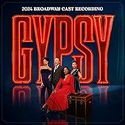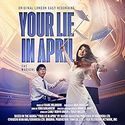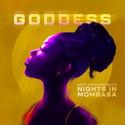|
 GYPSY GYPSY
2024 BROADWAY REVIVAL CAST
Arts Music/ Octoverse Media
Digital | CD & Vinyl due 7/25/25
Surprise! Perhaps you thought that there wasn't much that would be majorly different in the way we'd get to hear and think about the musical Gypsy, the classic that first came along in 1959. After all, there have been cast albums released for all five of the previous productions on Broadway, as well as the London mounting from a decade ago, the film, and a version made for TV, plus various studio cast recordings, foreign-language versions, and instrumental treatments. Well, the 25-track recording of the currently running revival (the digital version was released today, with CD and vinyl formats to follow on July 25; the 2-LP vinyl set will come with a 64-page, limited-edition hardcover book with 13 essays, photos, and the lyrics) brings fresh interpretations, sounds, stylings, and tempi to the table–with considerable spoken and orchestral bits not usually included for home listening. It's rewarding to have so much of the dialogue written by Arthur Laurents, the lyrics of Stephen Sondheim, plus more instrumental swaths of Jule Styne's melodies. (And let's remember that in 1959 the dance music arrangements were an early-career assignment for John Kander.) This treatment rarely feels like a superfluous clone, thanks in large part to some zingy or cozy additional orchestrations by Daryl Waters and additional arrangements by him and the musical director Andy Einhorn. Another aspect that will make fans of the Gypsy score prick up their ears is some different divvying-up of lines in songs such as the group number offering Chinese food and other attention to vaudeville booker Mr. Goldstone, and "Small World" (which also features sung lines preceding the usual start of "Funny, you're a stranger who's come here...").
And certainly, Audra McDonald's formidable Madame Rose is full of unique shadings and phrasing as she charges through this familiar fare her own way. While it takes some getting used to her combination of belt and the legit glorious soprano timbre we've come to expect from her (appearing here on many higher notes), it's nowhere near as disconcerting or odd as some skeptics predicted. While an out-and-out operatic voice would not be a fit for Rose, some pretty and sweet tones help make her not just primarily a full-steam-ahead steamroller. There's warmth and tenderness in her approach to "You'll Never Get Away from Me" that balances the surface forcefulness, and as Danny Burstein (a charming and solid Herbie) joins her vocally, he seems won over, with any friction between them now over for the moment. "Everything's Coming Up Roses" feels frantic in places, but that is–arguably–on target, in context of the character's desperation and resolve in the scene. But that's almost mild compared to the ferocity and rage unleashed in "Rose's Turn."
The cast members playing Rose's daughter June (Jade Smith and Marley Liane Gomes, both heard here, share the role of younger June; Jordan Tyson is the teen-age June), have apparently been encouraged to sing and declaim in an over-exuberant manner, often shrieking and squeaking. It may not be easy on the ears, but is effective in presenting her as a young stage performer (over)playing the "cute" card year after year.
There's relief from the stridency in "If Momma Was Married," the duet with Joy Woods as her sister, Louise, who later finds fame and acclaim as a stripper with the stage name Gypsy Rose Lee. Miss Woods impressively demonstrates the growth of her character's confidence and assertiveness, wistful and lonely in a lovely rendition of "Little Lamb," going from self-conscious to self-confident as she becomes a bigger and bigger star of striptease.
Some of the instrumental non-Styne (public domain) melodies used in the show, as part of the vaudeville acts, are presented, too: Sousa's "Stars and Stripes Forever" march; "Morning Mood" from the Peer Gynt Suite by Grieg. With extras and extensions and well-chosen key lines of dialogue for a generous sampling of Gypsy, some sections of the story come off often as raw and uncompromisingly non-sentimental, with enough comic relief and heart to remind us why the musical retains its power through the generations and that its lead role of the driven stage mother can accommodate various worthy approaches.
 MAYBE HAPPY ENDING MAYBE HAPPY ENDING
ORIGINAL BROADWAY CAST
Ghostlight Records
Digital | CD due 5/30/25 | Vinyl due 6/13/25
Regarding the recording of the musical Maybe Happy Ending, now on Broadway, there is no "maybe" about my conviction that it's one of the most delightful cast albums–and scores–to come along in recent years. It's liltingly melodic, with well-crafted, economic lyrics. The consistently delightful and characterful songs and book are by Hue Park and Will Aronson; the latter also devised the especially effective, colorful orchestrations played by the ten musicians led by keyboardist John Yun. The characters as played by stars Darren Criss and Helen J Shen–as robots who fall in love–are not just endearing but a step beyond that: adorable. Presenting wide-eyed innocence that doesn't cloy or feel effortful is quite an accomplishment.
Although new to New York, the musical debuted back in 2016 with Korean lyrics in South Korea's capital city of Seoul (where the story is set), followed by the English-language version in a production in Atlanta, Georgia a couple of years later.
The recording opens with what is presented as an actual old record itself: a crooner (voice of Dez Duron, on target with honeyed tones and sentiment) with the pastiche number titled "Why Love," a number that returns three times: a vocal reprise and two instrumentals (piano solo and bonus orchestral track). There are seven instrumentals among the 27 tracks. There are other songs that nostalgically recall pop prettiness of past decades in this unpretentious but rich score.
As the two formerly isolated tender-hearted robots, brought together because one needs a battery charger, they start to tip-toe into something resembling more complex human relationships and activities beyond their old, limited routines. They take risks and grow as they go, experiencing new territory, such as what it's like "When You're in Love," and, in "What I Learned from People," there's this sobering awareness: "Everything must end eventually/ Living with people has taught this to me./ I was brand new and naïve, looking for what to believe in/ When I first saw them kiss/ I chose to believe in this."
The digital booklet–which I assume will be available in physical form when the Maybe Happy Ending recording is released in CD and vinyl formats later this spring–has a detailed plot synopsis, numerous color photos of the production, and text with all the lyrics and dialogue heard.
 YOUR LIE IN APRIL: THE MUSICAL YOUR LIE IN APRIL: THE MUSICAL
2024 ORIGINAL LONDON CAST
Ghostlight Records
Digital
It all began in Japan and in Japanese. Based on the same-named popular romantic manga (graphic novel series) from that country–which also spawned a film, a TV series, and an earlier stage production–Your Lie in April has also been adapted as a musical. The music is by Frank Wildhorn. Debuting in Tokyo with Japanese lyrics in 2022 (and preserved on a cast recording in that language), it then was fitted with English words, by Carly Robyn Green and Tracy Miller, for a West End mounting last summer.
The score seesaws between some gentle moments and intense melodrama. The latter is a style Frank Wildhorn has dipped deeply into in the past, but I think his other scores favoring that non-subtle manner are far stronger. The musical score's saga focuses on a young guy who's a piano prodigy (sympathetically but kinetically sung by Zheng Xi Yong) with a creative block until he's helped by a supportive violinist (Mia Kobayashi, whose appealing voice can be balm-like or fiery, risking shrillness). Arrangements and orchestrations are by Jason Howland.
If you're allergic to throbbing music with a youthful-sounding edginess that builds and builds, adding voices, yet sometimes rely on repeated short musical phrases, then Your Lie in April may not, for the most part, be your cup of tea. But listen past the bombast, focusing on the words, and there is poignancy and artful wording to be found. Its most effective numbers are the less-is-more poignant ones that seem more heartfelt than hammering, such as the protagonists' duet "In Your Hands." The carpe diem message in "This Is Our Time" works well, too.
The final number that is sung, "I Can Hear You," is quite affecting. Its lyric begins: "Now, the lights have all gone dim/ When life was just about to start/ I'm left here with a broken heart/ You lived each moment on a whim/ The brightest star to light the sky/ I never thought to say goodbye." This is followed by a bonus track: a piano performance of Rachmaninoff's grand Prelude in G Minor. It's a dazzling end to a cast recording that is a mixed bag–but in its best, most heartfelt moments, the vocals do shine.
 GODDESS GODDESS
(MOTO MOTO PRESENTS NIGHTS IN MOMBASA)
5-TRACK EP OF SONGS FROM THE MUSICAL
Arts Music/ Octoverse Media
Digital
Next week, on April 29, the musical called Goddess will start preview performances at the Public Theater in Manhattan. It was previously seen in California (at Berkeley Repertory Theatre, 2022). Five intriguing, varied songs by cast members were released this month as an EP; three of them feature the dazzling vocals of Amber Iman, who was Tony-nominated for her commanding performance in a key supporting role in the short-lived Lempicka. Her role here is that of Goddess's titular deity, the goddess of music. She is–in a word–mesmerizing. Particularly rewarding are the sensitive ballad "Learn to Love" and a passionate duet with Austin Scott called "Near You." "Honey Sweet" is sultry, and ultimately soaring. The setting is an Afro-jazz nightclub called Moto Moto in Mombasa, a city in Kenya, so there's a very lively party-like feel at times, particularly on other tracks where rhythm and joy are the main factors.
The songs by Michael Thurber are described in press materials as "genre-defying," and that's apt. Judging by these samples, it feels neither like old-school musical theatre nor its more recent "contemporary" brand. Eclectic and potent, the five tastes of the Goddess score are a mix of percussion-driven numbers and slinky or ethereal moods.
|
|